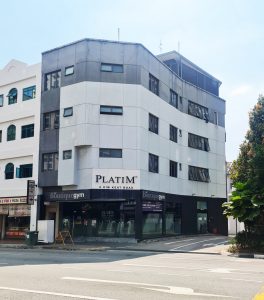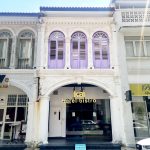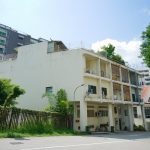The 4-storey freehold building at Kim Keat is for sale at an indicative price of S$9.5 million

A 4-storey freehold building at 8 Kim Keat Road is available for sale via Expression of Interest (EOI) exercise announced Colliers International on March 3, 2021. The 4-storey freehold building is for sale at an indicative price of S$9.5 million, translating to approximately S$1,335 psf. This is a rare freehold corner building with prominent road frontage and is strategically located close to the Novena Medical Hub.
The 4-storey freehold building sits on a 2,015 sq ft site zoned for Residential with Commercial at 1st Storey with Plot Ratio 3.0 under the Urban Redevelopment Authority’s Master Plan 2019.
Table of Contents
With a built-in area of 7,112 sq ft, the 4-storey freehold building is reasonably new building and was refurbished in 2012. It is currently fully leased and offers investors an opportunity to acquire an immediate income-generating asset located in the City Fringe.
Steven Tan, Senior Director of Investment Services at Colliers International, said, “this is a well-appointed purpose-built property that is suitable for co-living spaces. The current pandemic situation has encouraged remote working and a shift from working in traditional office spaces. This, together with a ready catchment of employment in the Novena Medical Hub, we envisage a buoyant and positive demand for co-living spaces. Future development plans in this district will allow for better accessibility and greater convenience in and about the area. This will only add to the feasibility of co-living spaces in the vicinity.”
Mr Tan added, “Through repositioning of the asset, 8 Kim Keat Road has the potential to enjoy upside in capital value and income.”
The EOI for the 4-storey freehold building will close on Wednesday, 7 April 2021, at 3 pm.
Co-living is a term used to describe a living arrangement that is something more than shared space. The Millennial workforce’s move towards co-living, is opening up opportunities for real estate developers and investors in Singapore.
Typically, a co-living facility will offer tenants small rooms but also shared facilities such as a TV room or a gym. There is also a social aspect; some facilities have a manager who will organise events. As well as convenience and community, co-living facilities also claim to offer cheaper rent than an individual apartment.
At present, some developments described as co-living are no more than upmarket dormitories for budget-conscious students, while others are just shared apartments with different branding. But from the property investor’s point of view, co-living offers an attractive opportunity to gain extra revenue from services and to be able to fit a larger number of rooms in a single building. Hotel owners have also been converting under performing hotels to co-living facilities.
In Singapore, affordable public housing is available to a large portion of the population and perhaps due to this, there is only a small portion of rental housing or co-living establishments. One of the key challenges faced by the co-living market in Singapore is the deeply entrenched home-ownership culture among Singaporeans which, coupled with the ability to unlock savings in Central Provident Fund’s Ordinary Account through property acquisition, has contributed to Singaporeans’ preference to buy rather than rent.
“But JTC Corporation’s move to put up a pilot Concept and Price Tender to build, own and operate a co-living development at Nepal Hill in onenorth could be a potential game changer,” noted Mr Paul Ho, chief mortgage officer at iCompareLoan.
Nepal Hill in onenorth will allow co-living residents to have their own bedrooms with an attached bathroom and they would share communal spaces such as kitchens, lounges and living/entertainment areas with other residents. The plot of land is zoned as residential and will be approved for serviced apartment use to cater to residents who are envisaged to stay between two weeks and one year.
The tender for Nepal Hill in onenorth site closed on 30 July 2018 with four bidders vying for the site. The site was eventually awarded to Ascott Residence Trust who offered the highest bid of $62.4 million for the site, together with a proposal that features creative use of communal spaces and comprehensive programmes to promote social bonding, wellness, personal development and business networking for future residents. The new facility, to be named lyf onenorth Singapore, is expected to open for business in 2021.
A JLL report from 2019 said that in Singapore, co-living space primarily appeals to millennial expatriates, and that demand was boosted by the rising number of single-household expats engaged on a contract basis or working on project assignments. It added that the one-stop services offered by co-living operators provide expatriates with an alternative accommodation option that is simpler than renting a conventional room and cheaper than renting a serviced apartment or hotel.
Given the more than 1.6 million foreign population in Singapore (including permanent residents but excluding construction and foreign domestic workers), there is potential for growth for the co-living market in Singapore said the research report.
“What else would be attractive to investors about this property is, borrowers for commercial properties are allowed to take a loan-to-value ratio (LTV) of up to 80%, even with outstanding residential mortgages,” noted Mr Ho.
The maximum loan tenor typically stands at 30 years. However, loans for commercial property tend to command a higher interest rate relative to residential property loans. Like the latter, these loans come in
- Fixed Rate Package
- Variable (Floating) Rate Package
The requirements for a commercial loan, however, are more stringent. For example, the LTV ratio is contingent on whether the property is for owner-occupation or investment, with the latter subjected to stricter criteria by some banks. The next section explains the approval conditions in greater detail.






